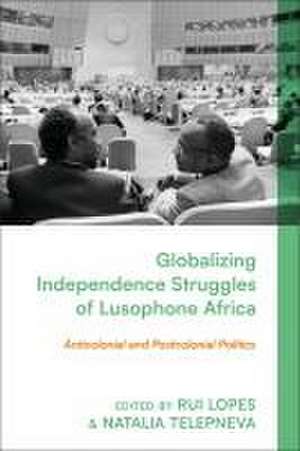Globalising Lusophone Africa’s Independence Struggles: Identities, Ideologies, and Networks
Editat de Rui Lopes, Natalia Telepnevaen Limba Engleză Hardback – 4 sep 2024
Preț: 511.81 lei
Preț vechi: 595.13 lei
-14% Nou
Puncte Express: 768
Preț estimativ în valută:
97.98€ • 102.23$ • 82.13£
97.98€ • 102.23$ • 82.13£
Carte disponibilă
Livrare economică 20 februarie-06 martie
Preluare comenzi: 021 569.72.76
Specificații
ISBN-13: 9781350378308
ISBN-10: 1350378305
Pagini: 272
Dimensiuni: 156 x 234 mm
Greutate: 0.58 kg
Editura: Bloomsbury Publishing
Colecția Zed Books
Locul publicării:London, United Kingdom
ISBN-10: 1350378305
Pagini: 272
Dimensiuni: 156 x 234 mm
Greutate: 0.58 kg
Editura: Bloomsbury Publishing
Colecția Zed Books
Locul publicării:London, United Kingdom
Caracteristici
Shows that Lusophone Africa's independence struggles are not idiosyncratic, but rather connect with events, individuals, and ideas from across the globe
Notă biografică
Natalia Telepneva is Lecturer in International History at University of Strathclyde, UK. She is the author of Cold War Liberation: The Soviet Union and Collapse of Portuguese Empire in Africa, 1961-1975 (2022) and co-editor of Warsaw Pact Intervention in the Third World: Aid and Influence in the Cold War (I.B Tauris, 2018).Rui Lopes is Lecturer in Contemporary History at Birkbeck University, UK, and NOVA University, Lisbon, Portugal. He is the author of West Germany and the Portuguese Dictatorship, 1968-1974: Between Cold War and Colonialism (2014).
Cuprins
IntroductionNatalia Telepneva, University of Strathclyde, UK, and Rui Lopes, Birkbeck, University of London, UK, and NOVA University of Lisbon, PortugalPART 1. IMAGES AND IDEAS OF LIBERATIONChapter 1: Bourgeois Revolutionaries: Holden Roberto, American Anticommunism, and the Angolan Revolutionary Government in Exile, 1961-1964Alex J. Marino, Lecturer in History, University of Arkansas, USAChapter 2: "Our Country or Death": Reconstructing COREMO's Political IdeologyLazlo Passemiers, Senior Lecturer, the History Department, University of the Free State, South AfricaChapter 3: That's Your Responsibility - Marxist Debates and Amilcar Cabral's Political ThoughtRita Lucas Narra, PhD Candidate, NOVA University of Lisbon, PortugalChapter 4: Hot Blood: The Assassination of Amílcar Cabral. Obituaries and The Struggle for Memory and BiographyLeonor Pires Martins, PhD Candidate, NOVA University of Lisbon, PortugalChapter 5: Cold War Entanglements in the Liberation Struggle and Early Post-Independence Period of São Tomé and PríncipeInês Nascimento Rodrigues, Research Fellow, Centre for Social Studies, Coimbra University, Portugal, and Gerhard Seibert, Associate Researcher, Instituto Universitário de Lisboa (ISCTE-IUL), PortugalPART 2. REGIONAL AND INTERNATIONAL NETWORKS AND SOLIDARITIESChapter 6: The Year After Africa: How Angola and Goa Undermined the UN and Militarized Self-DeterminationJoseph Parrott, Assistant Professor, Department of History, The Ohio State University, USAChapter 7: The United Nations Decolonization Committee and Foreign Investments in Portuguese Colonies, 1965-1974Aurora Almada e Santos, Research Fellow, NOVA University of Lisbon, PortugalChapter 8: Fighting for Neutrality and Non-Alignment. The Liberation Movements of the Portuguese Colonies and the Afro-Asian ConferencesJulião Soares Sousa, Research Fellow, University of Coimbra, PortugalChapter 9: From Supporters to Cooperants: The Canadian Toronto Committee for the Liberation of Southern Africa and its Relationship with FRELIMOMarçal de Menezes Paredes, Associate Professor of History, the Pontifical Catholic University of Rio Grande do Sul, BrazilChapter 10: A Southern African Approach: The Public Diplomacy of the Luso-African Liberation Movements in the UKAna Moledo, PhD Candidate, University of Leipzig, GermanyPART 3.POST-INDEPENDENCE STRUGGLESChapter 11: The Condor Spreads Its Wings: The Latin American Secret Missions in Africa after the Carnation RevolutionGisele Lobato, PhD Candidate, Instituto Universitário de Lisboa (ISCTE-IUL), PortugalChapter 12: Between Internationalism and Orientalism: Individual Narratives and Collective Memory of the Russian Veterans of the Angolan Civil War, 1975-2002Daria Zelenova, Senior Research Fellow, Higher School of Economics, Moscow, RussiaChapter 13: Polish Economic and Military Support for Angola, 1975-1989Przemyslaw Gasztold, Assistant Professor, War Studies University in Warsaw, Institute of National Remembrance, Warsaw, PolandChapter 14: The PAIGC's Post-Independence Non-Alignment in the Cold War ContextVictor Barros, Research Fellow, NOVA University of Lisbon, Portugal, Osvaldino Monteiro, Research Fellow, Faculdade de Educação e Desporto, Universidade de Cabo Verde, Cape Verde, and Suzano Costa, Research Fellow, Observatório Político, Universidade de Lisboa, PortugalChapter 15: Film culture and decolonization in Guinea Bissau during the Cold War (1973-1980)Paulo Cunha, Assistant Professor, the Department of Arts, University of Beira Interior, PortugalChapter 16: Comparing representations of Guinea-Bissau's 1980 coupTeresa Almeida Cravo, Assistant Professor in International Relations, Faculty of Economics & Centre for Social Studies, University of Coimbra, Portugal
